Stanford Memorial Church stained glass returned to original beauty after vandalization
For months, a team has been reconstructing some of the iconic stained-glass windows at Stanford Memorial Church after they were vandalized over the summer. The repaired century-old windows were installed in mid-November.
Several months ago, a team of inspectors discovered something amiss with some of the iconic stained-glass windows at Stanford Memorial Church.
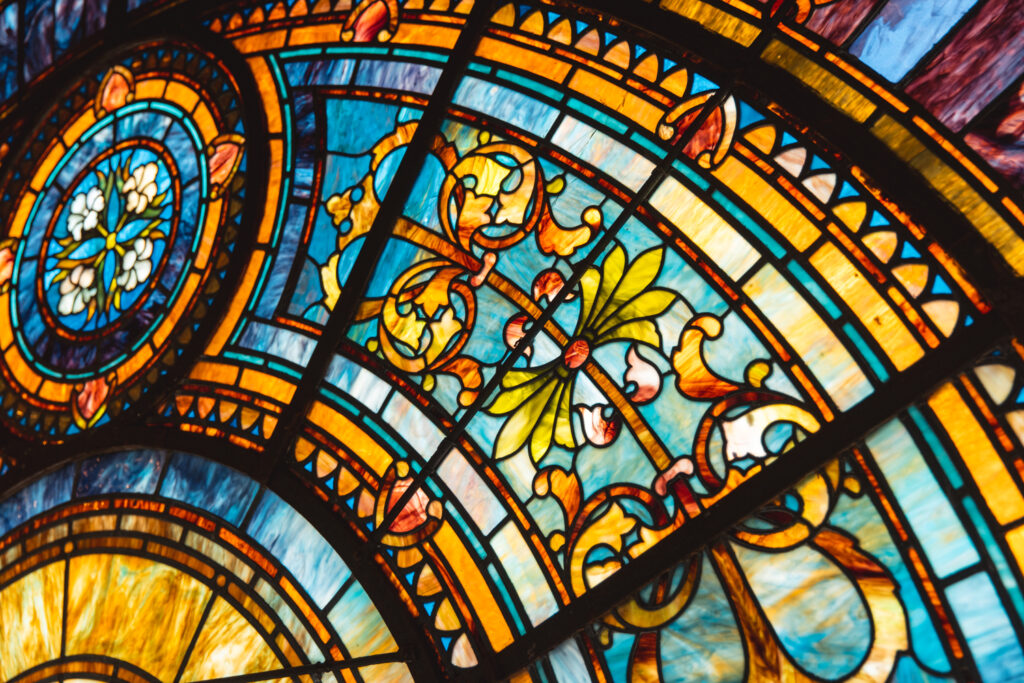
A portion of the stained glass on the front of the Stanford Memorial Church, as seen on Nov. 16, 2021. (Image credit: Andrew Brodhead)
A routine survey by the Land, Buildings and Real Estate’s (LBRE) maps and records team revealed damage to the Lilies of the Field window at the front of the church.
The team later determined that multiple wine bottles had been thrown through the window with enough force to break three layers of glass, damage lead and chip sandstone, said Mindy Dinh, an LBRE engineer who oversees the part of campus where the church is located.
“Someone just ruined a piece of art that, in my eyes, is priceless,” Dinh said.
The windows were reinstalled in 1912 after the church was rebuilt following the 1906 earthquake. Many thousands of people have sought spiritual solace, married and mourned under the light that has streamed through the stained glass since the church’s 1903 dedication.
Restoring the windows was not an easy task, said Dinh, who coordinated the project to remove, repair and reinstall the stained glass. The project itself was a “form of art,” she said.
“It’s so interesting how these artists repair it. I’m amazed at their work.”
Lesley Bone has been a conservator for Stanford Memorial Church for more than three decades and oversaw repair to the century-old windows.
“Each piece of glass is so unique and obviously has been chosen specifically for the area in the window where it was placed,” Bone said. “It’s incredibly hard to replicate that.”
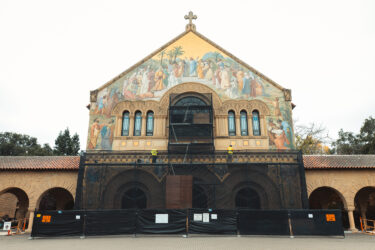
Image credit: Andrew Brodhead
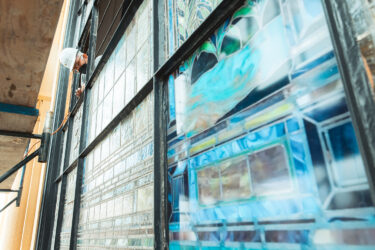
Image credit: Andrew Brodhead
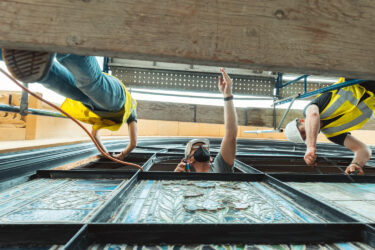
Image credit: Andrew Brodhead
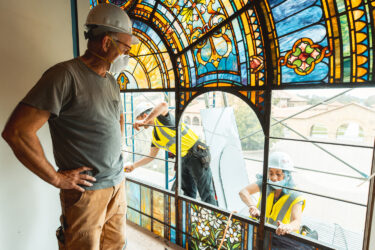
Image credit: Andrew Brodhead
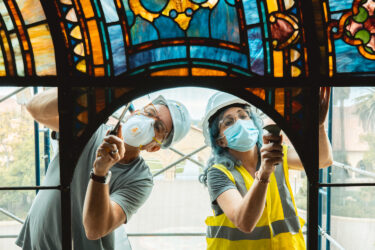
Image credit: Andrew Brodhead

Image credit: Andrew Brodhead
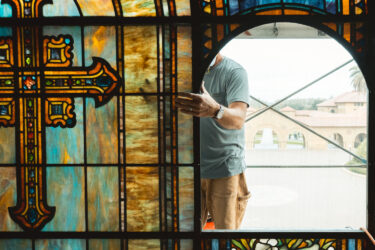
Image credit: Andrew Brodhead
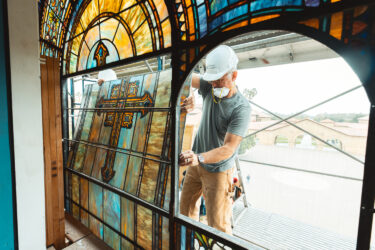
Image credit: Andrew Brodhead

Image credit: Andrew Brodhead
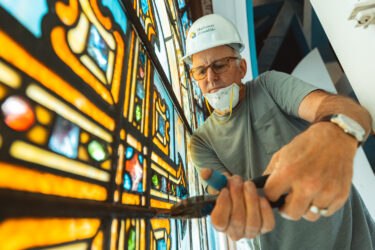
Image credit: Andrew Brodhead
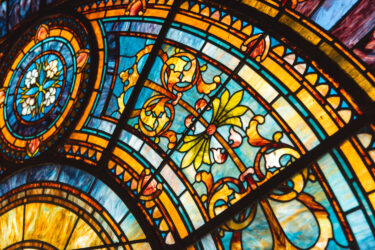
Image credit: Andrew Brodhead
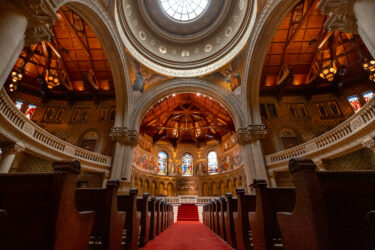
Image credit: Andrew Brodhead
A unique history
Construction of Memorial Church began in 1899. Ten men worked for two years carving the sandstone arches, borders and pillar capitals for the church.
Jane Stanford commissioned Frederick S. Lamb to create dozens of stained-glass windows for it. The fact that all of the church’s stained-glass windows were designed by one company is rare, Bone said.
“Usually in churches, somebody sponsors a stained-glass window or the church is extended at one point and different windows are put in,” she explained.
Lamb also uniquely designed the windows to read as if figures are “looking” at you from both the inside and outside, an effect achieved by using three layers of glass.
This is not the first time Memorial Church has been vandalized. “A church is very heavy with meaning and so people are drawn to it in moments of great anger and despair,” Bone said.
In 1969, the windows were covered with steel mesh to protect them during social turmoil in the ’60s, and it wasn’t removed until 1990 following Loma Prieta earthquake repairs.
“Nobody knew you could read these beautiful images from the outside,” Bone said.
Since then, periodic incidents of vandalism have occurred.
A giant puzzle
In the past, windows were boarded up when damaged. This time, LBRE’s Architectural Trades printed plexiglass that was temporarily installed as the church held weddings and memorials for former U.S. Secretary of State and Stanford scholar George Shultz and former university President Donald Kennedy.
Glass was located on the outside ledge and inside the church, but nothing was on the ground outside, which is part of why no one immediately noticed the damage, Dinh said. Whoever vandalized the windows apparently cleaned it up. There was only sticky red liquid appearing to be wine in the middle of the Quad. There’s no camera footage of what happened, and a police report was filed on the incident.
The team took all the glass they could gather to a local studio, Helios Art Glass, where stained-glass expert Connie Levathes and Bone reviewed every piece. They not only had to figure out which panel the glass belonged to but also which layer.
“It’s like a giant puzzle,” Dinh said.
They then created a rubbing to understand where the cracks were and what glass was missing, carefully documenting every step.
At times, small lead lines were added to broken panels. There were tiny triangles of glass missing so they made a resin fill for those areas. When glass had to be replaced, it involved lengthy hunts to find pieces that matched as closely as possible to the existing panel.
It’s not as easy as just finding glass of the same color. It often involves multiple colors in a piece, such as an amber pink glass used a lot in the church, and may need to be more, or less, opaque.
An artist must also understand what happens when a light goes through each of the three layers.
“It’s quite a complex color theory exercise that took place in making these windows,” Bone said. “You’re sort of using light as the vehicle for mixing colors.”
Unable to find what she needed locally, Levathes traveled to Los Angeles to check out a stash of older glass there. Luckily she found some of the darker colors needed and shipped them to the Bay Area.
“It shows you it is irreplaceable,” Bone said. “It is really hard to match. So, when we’re looking for a replacement, we really look. We don’t just look in the bottom drawer, we look in other people’s bottom drawers.”
Then, Levathes used a special epoxy with the same refractive index as glass so when the adhesive is placed in a crack, it makes the crack invisible, taking about a week to set.
After months of meticulous and tedious work to reconstruct the windows, the scaffolding went up Nov. 15 and reinstallation began the next day, with work timed to avoid disturbing Mass.
Dinh and Bone noted that the university’s leadership fully supported the project and care involved to restore the windows.
“It’s really great that we have this support and that they understand how important these windows and the church are overall,” Dinh said. “I want people to know how much work has gone into this so, hopefully, it prevents it from happening again.”